高二级第一学期第一次月考英语试题实验班
- 格式:doc
- 大小:70.00 KB
- 文档页数:10
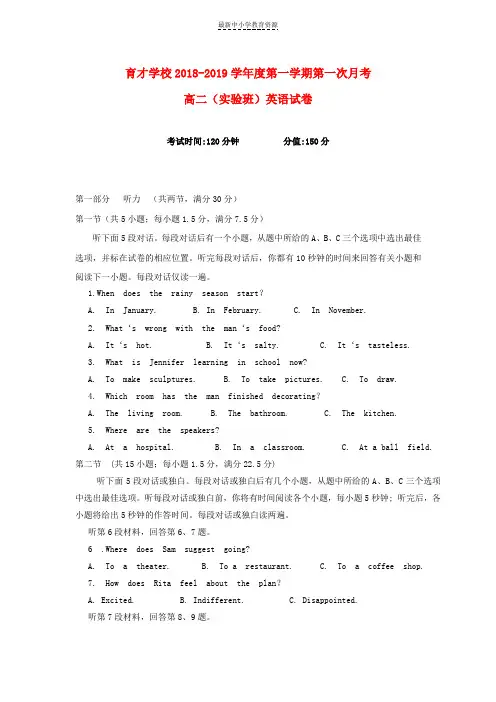
育才学校2018-2019学年度第一学期第一次月考高二(实验班)英语试卷考试时间:120分钟分值:150分第一部分听力(共两节,满分30分)第一节(共5小题;每小题1.5分,满分7.5分)听下面5段对话。
每段对话后有一个小题,从题中所给的A、B、C三个选项中选出最佳选项,并标在试卷的相应位置。
听完每段对话后,你都有10秒钟的时间来回答有关小题和阅读下一小题。
每段对话仅读一遍。
1.When does the rainy season start?A. In January.B. In February.C. In November.2. What‘s wrong with the man‘s food?A. It‘s hot.B. It‘s salty.C. It‘s tasteless.3. What is Jennifer learning in school now?A. To make sculptures.B. To take pictures.C. To draw.4. Which room has the man finished decorating?A. The living room.B. The bathroom.C. The kitchen.5. Where are the speakers?A. At a hospital.B. In a classroom.C. At a ball field. 第二节 (共15小题;每小题1.5分,满分22.5分)听下面5段对话或独白。
每段对话或独白后有几个小题,从题中所给的A、B、C三个选项中选出最佳选项。
听每段对话或独白前,你将有时间阅读各个小题,每小题5秒钟; 听完后,各小题将给出5秒钟的作答时间。
每段对话或独白读两遍。
听第6段材料,回答第6、7题。
6 .Where does Sam suggest going?A. To a theater.B. To a restaurant.C. To a coffee shop.7. How does Rita feel about the plan?A. Excited.B. Indifferent.C. Disappointed.听第7段材料,回答第8、9题。
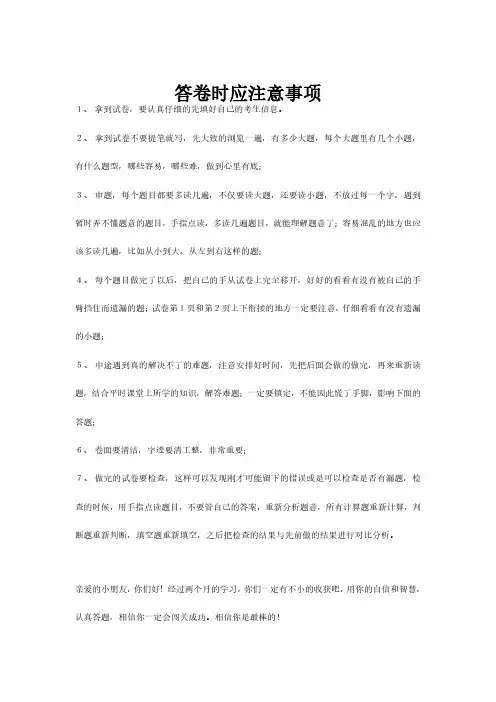
答卷时应注意事项1、拿到试卷,要认真仔细的先填好自己的考生信息。
2、拿到试卷不要提笔就写,先大致的浏览一遍,有多少大题,每个大题里有几个小题,有什么题型,哪些容易,哪些难,做到心里有底;3、审题,每个题目都要多读几遍,不仅要读大题,还要读小题,不放过每一个字,遇到暂时弄不懂题意的题目,手指点读,多读几遍题目,就能理解题意了;容易混乱的地方也应该多读几遍,比如从小到大,从左到右这样的题;4、每个题目做完了以后,把自己的手从试卷上完全移开,好好的看看有没有被自己的手臂挡住而遗漏的题;试卷第1页和第2页上下衔接的地方一定要注意,仔细看看有没有遗漏的小题;5、中途遇到真的解决不了的难题,注意安排好时间,先把后面会做的做完,再来重新读题,结合平时课堂上所学的知识,解答难题;一定要镇定,不能因此慌了手脚,影响下面的答题;6、卷面要清洁,字迹要清工整,非常重要;7、做完的试卷要检查,这样可以发现刚才可能留下的错误或是可以检查是否有漏题,检查的时候,用手指点读题目,不要管自己的答案,重新分析题意,所有计算题重新计算,判断题重新判断,填空题重新填空,之后把检查的结果与先前做的结果进行对比分析。
亲爱的小朋友,你们好!经过两个月的学习,你们一定有不小的收获吧,用你的自信和智慧,认真答题,相信你一定会闯关成功。
相信你是最棒的!第一学期第一次阶段考试高二英语试题注意事项:1. 答题前,考生务必将自己的姓名、考生号、考场号、座位号填写在答题卡上。
2. 回答选择题时,选出每小题答案后,用铅笔把答题卡上对应题目的答案标号涂黑。
如需改动,用橡皮擦干净后,再选涂其他答案标号。
回答非选择题时,将答案写在答题卡上。
写在本试卷上无效。
3. 考试结束后,将答题卡交回。
第一部分听力(共两节,满分30分)做题时,先将答案标在试卷上。
录音内容结束后,你将有两分钟的时间将试卷上的答案转涂到答题卡上。
第一节(共5小题;每小题1.5分,满分7.5分)听下面5段对话。
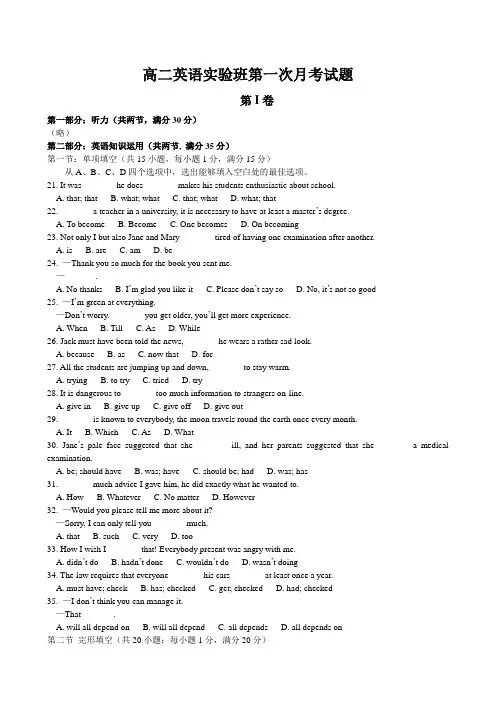
高二英语实验班第一次月考试题第I卷第一部分:听力(共两节,满分30分)(略)第二部分:英语知识运用(共两节, 满分35分)第一节:单项填空(共15小题,每小题1分,满分15分)从A、B、C、D四个选项中,选出能够填入空白处的最佳选项。
21. It was _______ he does _______ makes his students enthusiastic about school.A. that; thatB. what; whatC. that; whatD. what; that22. _______ a teacher in a university, it is necessary to have at least a master’s degree.A. To becomeB. BecomeC. One becomesD. On becoming23. Not only I but also Jane and Mary _______ tired of having one examination after another.A. isB. areC. amD. be24. —Thank you so much for the book you sent me.—_______.A. No thanksB. I’m glad you like itC. Please don’t say soD. No, it’s not so good25. —I’m green at everything.—Don’t worry. _______ you get older, you’ll get more experience.A. WhenB. TillC. AsD. While26. Jack must have been told the news, _______ he wears a rather sad look.A. becauseB. asC. now thatD. for27. All the students are jumping up and down, _______ to stay warm.A. tryingB. to tryC. triedD. try28. It is dangerous to _______ too much information to strangers on-line.A. give inB. give upC. give offD. give out29. _______ is known to everybody, the moon travels round the earth once every month.A. ItB. WhichC. AsD. What30. Jane’s pale face suggested that she _______ ill, and her parents suggested that she _______ a medical examination.A. be; should haveB. was; haveC. should be; hadD. was; has31. _______ much advice I gave him, he did exactly what he wanted to.A. HowB. WhateverC. No matterD. However32. —Would you please tell me more about it?—Sorry, I can only tell you _______ much.A. thatB. suchC. veryD. too33. How I wish I _______ that! Everybody present was angry with me.A. didn’t doB. hadn’t doneC. wouldn’t doD. wasn’t doing34. The law requires that everyone _______ his cars _______ at least once a year.A. must have; checkB. has; checkedC. get; checkedD. had; checked35. —I don’t think you can manage it.—That _______.A. will all depend onB. will all dependC. all dependsD. all depends on第二节完形填空(共20小题;每小题1分,满分20分)阅读下面短文,撑握其大意,然后从各题所给的四个选项(A、B、C和D)中,选出最佳选项My bed is supposed to be the best part of my home — the place where I go to find 36 and relaxation after a long, stressful day. So, lately, why do I get 37 just looking at it? I can’t leave this problem unsolved to the next day, because I can’t get to 38 in the first place: I am a victim of insomnia (失眠).I’m not 39 : studies show that more than one in three people worldwide 40 insomnia. It takes different 41 : some people can get to sleep on time, but 42 much too early; others get a full-night’s sleep but still 43 very tired when they wake up. And then there are people like me, ordinary insomniacs who toss and turn all 44 , trying to fall asleep.Insomnia is most commonly a side effect of depression, but it can 45 be caused by many other ailments (小病痛). To find the 46 , doctors first find out the cause by 47 a “sleep diary,” in which you record your sleep habits. The diary may reveal (揭示) lifestyle patterns, 48 an afternoon nap, which are causing your 49 . Dr. Mark Dyken, a specialist in sleep disorders, writes that, “a good sleep diary can often 50 the patients to ‘cure themselves.’”A good night’s sleep is created during the day. 51 in the beginning or middle of the day, and 52 from caffeine, alcohol and cigarettes in the afternoon and evening. After dark, dim (使暗淡) the lights and try to 53 stress. Our bodies like consistent (一贯的) patterns, so we should let 54 know that it’s time to wind down.If you can’t fall asleep, keep the lights 55 . Try reading a book or listening to soft music. You’ll most likely be asleep.36. A. courage B. knowledge C. decision D. energy37. A. nervous B. comfortable C. calm D. satisfied38. A. live B. rest C. sleep D. play39. A. sad B. alone C. pleased D. afraid40. A. suffers from B. benefits from C. quarrels about D. struggles for41. A. ways B. effects C. results D. forms42. A. get up B. wake up C. dream D. turn over43. A. feel B. become C. prove D. look44. A. evening B. day C. night D. time45. A. still B. also C. even D. only46. A. cause B. reason C. excuse D. cure47. A. keeping B. discussing C. writing D. describing48. A. as B. like C. for D. about49. A. illness B. question C. problem D. worry50. A. have B. allow C. let D. make51. A. Sleep B. Work C. Read D. Exercise52. A. stay away B. come out C. stay out D. make out53. A. remember B. increase C. keep D. reduce54. A. it B. that C. them D. this55. A. bright B. low C. bad D. good第三部分:阅读明白得(共20小题,每题2分,满分40分)阅读下列短文,从每题所给的四个选项(A、B、C和D)中,选出最佳选项。
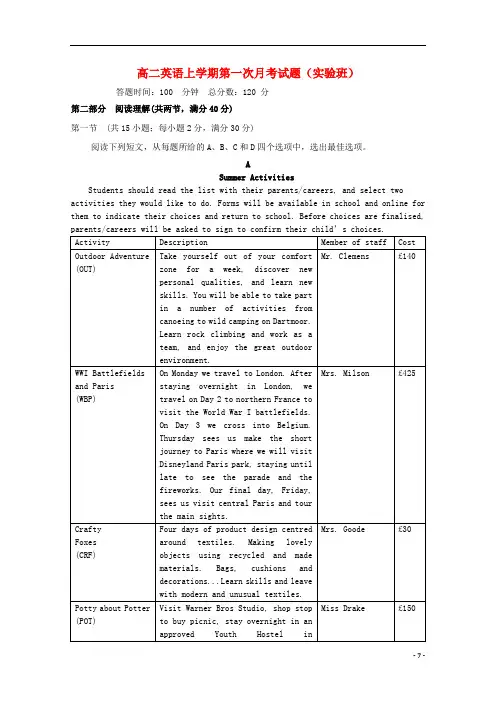
高二英语上学期第一次月考试题(实验班)答题时间:100 分钟总分数:120 分第二部分阅读理解(共两节,满分40分)第一节 (共15小题;每小题2分,满分30分)阅读下列短文,从每题所给的A、B、C和D四个选项中,选出最佳选项。
ASummer ActivitiesStudents should read the list with their parents/careers, and select two activities they would like to do. Forms will be available in school and online for them to indicate their choices and return to school. Before choices are finalised,A.OUT.B.WBP.C.CRF.D.POT.22.What will the students do on Tuesday with Mrs. Wilson?A. Travel to London.B. See a parade and fireworks.C. Tour central Paris.D. Visit the WWI battlefields.23.How long does Potty about Potter last?A. Two days.B. Four days.C. Five days.D.One week.BMany of us love July because it’s the month when nature’s berries and stone fruits are in abundance. These colourful and sweet jewels form British Columbia’s fields are little powerhouses of nutritional protection.Of the common berries, strawberries are highest in vitamin C, although, because of their seeds, raspberries contain a little more protein (蛋白质), iron and zinc (not that fruits have much protein). Blueberries are particularly high in antioxidants (抗氧化物质). The yellow and orange stone fruits such as peaches are high in the carotenoids we turn into vitamin A and which are antioxidants. As for cherries (樱桃), they are so delicious who cares? However, they are rich in vitamin C.When combined with berries of slices of other fruits, frozen bananas make an excellent base for thick, cooling fruit shakes and low fat “ice cream”. For this purpose, select ripe bananas for freezing as they are much sweeter. Remove the skin and place them in plastic bags or containers and freeze. If you like, a squeeze of fresh lemon juice on the bananas will prevent them turning brown. Frozen bananas will last several weeks, depending on their ripeness and the temperature of the freezer.zx.x.kIf you have a juicer, you can simply feed in frozen bananas and some berries or sliced fruit. Out comes a “soft-serve” creamy dessert, to be eaten right away. This makes a fun activity for a children’s party; they love feeding the fruit and frozen bananas into the top of the machine and watching the ice cream come out below.24. What does the author seem to like about cherries?A. They contain protein.B. They are high in vitamin A.C. They have a pleasant taste.D. They are rich in antioxidants.25. Why is fresh lemon juice used in freezing bananas?A. To make them smell better.B. To keep their colour.C. To speed up their ripening.D. To improve their nutrition.26. What is “a juicer” in the last paragraph?A. A dessert.B. A drink.C. A container.D. A machine.27. From which is the text probably taken?A. A biology textbook.B. A health magazine.C. A research paper.D. A travel brochure.CTeens and younger children are reading a lot less for fun, according to a Common Sense Media report published Monday.While the decline over the past decade is steep for teen readers, some data in the report shows that reading remains a big part of many children’s lives, and indicates how parents might help encourage more reading.According to the report’s key findings, “the proportion (比例) who say they ‘hardly ever’ read for fun has gone from 8 percent of 13-year-olds and 9 percent of 17-year-olds in 1984 to 22 percent and 27 percent respectively today.”The report data shows that pleasure reading levels for younger children, ages 2—8, remain largely the same. But the amount of time spent in reading each session has declined, from closer to an hour or more to closer to a half hour per session. When it comes to technology and reading, the report does little to counsel(建议) parents looking for data about the effect of e-readers and tablets on reading. It does point out that many parents still limit electronic reading, mainly due to concerns about increased screen time.The most hopeful data shared in the report shows clear evidence of parents serving as examples and important guides for their kids when it comes to reading. Data shows that kids and teens who do read frequently, compared to infrequent readers, have more books in the home, more books purchased for them, parents who read more often, and parents who set aside time for them to read.As the end of school approaches, and school vacation reading lists loom(逼近) ahead, parents might take this chance to step in and make their own summer reading list and plan a family trip to the library or bookstore.28. What is the Common Sense Media report probably about?A. Children’s reading habits.B. Quality of children’s books.C. Children’s after-class activities.D. Parent-child relationships.29. Where can you find the data that best supports "children are reading a lot less for fun"?A. In paragraph 2.B. In paragraph 3.C. In paragraph 4.D. In paragraph 5.30. Why do many parents limit electronic reading?A. E-books are of poor quality.B. It could be a waste of time.C. It may harm children’s health.D. E-readers are expensive.31. How should parents encourage their children to read more?A. Act as role models for them.B. Ask then to write book reports.C. Set up reading groups for them.D. Talk with their reading class teachers.DWe’ve all been there: in a lift, in line at the bank or on an airplane, surrounded by people who are, like us, deeply focused on their smartphones or, worse, struggling with the uncomfortable silence.What’s the problem? It’s possible that we all have compromised conversational intelligence. It’s more likely that none of us start a conversation because it’s awkward and challenging, or we think it’s annoying and unnecessary. But the next time you find yourself among strangers, consider that small talk is worth the trouble. Experts say it’s an inv aluable social practice that results in big benefits.Dismissing small talk as unimportant is easy, but we can’t forget that deep relationships wouldn’teven exist if it weren’t for casual conversation. Small talk is the grease(润滑剂) for social communication, says Bernardo Carducci, director of the Shyness Research Institute at Indiana University Southeast. "Almost every great love story and each big business deal begins with small talk," he explains. "The key to successful small talk is learning how to connect with others, not just communicate with them."In a 2014 study, Elizabeth Dunn, associate professor of psychology at UBC, invited people on their way into a coffee shop. One group was asked to seek out an interaction(互动) with its waiter; the other, to speak only when necessary. The results showed that those who chatted with their server reported significantly higher positive feelings and a better coffee shop experience. "It’s not that talking to the waiter is better than talking to your husband," says Dunn. "But interactions with peripheral(边缘的) members of our social network matter for our well-being also."Dunn believes that people who reach out to strangers feel a significantly greater sense of belonging, a bond with others. Carducci believes developing such a sense of belonging starts with small talk. "Small talk is the basis of good manners,"he says.32. What phenomenon is described in the first paragraph?A. Addiction to smartphones.B. Inappropriate behaviours in public places.C. Absence of communication between strangers.D. Impatience with slow service.33. What is important for successful small talk according to Carducci?A. Showing good manners.B. Relating to other people.C. Focusing on a topic.D. Making business deals.34. What does the coffee-shop study suggest about small talk?A. It improves family relationships.B. It raises people’s confidence.C. It matters as much as a formal talk.D. It makes people feel good.35. What is the best title for the text?A. Conversation CountsB. Ways of Making Small TalkC. Benefits of Small TalkD. Uncomfortable Silence第二节 (共5小题;每小题2分,满分10分)根据短文内容,从短文后的选项中选出能填入空白处的最佳选项。
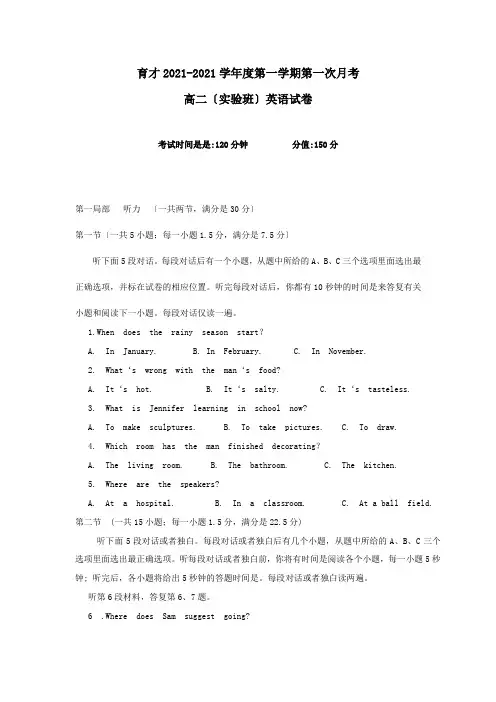
育才2021-2021学年度第一学期第一次月考高二〔实验班〕英语试卷考试时间是是:120分钟分值:150分第一局部听力〔一共两节,满分是30分〕第一节〔一共5小题;每一小题1.5分,满分是7.5分〕听下面5段对话。
每段对话后有一个小题,从题中所给的A、B、C三个选项里面选出最正确选项,并标在试卷的相应位置。
听完每段对话后,你都有10秒钟的时间是来答复有关小题和阅读下一小题。
每段对话仅读一遍。
1.When does the rainy season start?A. In January.B. In February.C. In November.2. What‘s wrong with the man‘s food?A. It‘s hot.B. It‘s salty.C. It‘s tasteless.3. What is Jennifer learning in school now?A. To make sculptures.B. To take pictures.C. To draw.4. Which room has the man finished decorating?A. The living room.B. The bathroom.C. The kitchen.5. Where are the speakers?A. At a hospital.B. In a classroom.C. At a ball field. 第二节 (一共15小题;每一小题1.5分,满分是22.5分)听下面5段对话或者独白。
每段对话或者独白后有几个小题,从题中所给的A、B、C三个选项里面选出最正确选项。
听每段对话或者独白前,你将有时间是阅读各个小题,每一小题5秒钟; 听完后,各小题将给出5秒钟的答题时间是。
每段对话或者独白读两遍。
听第6段材料,答复第6、7题。
6 .Where does Sam suggest going?A. To a theater.B. To a restaurant.C. To a coffee shop.7. How does Rita feel about the plan?A. Excited.B. Indifferent.C. Disappointed.听第7段材料,答复第8、9题。
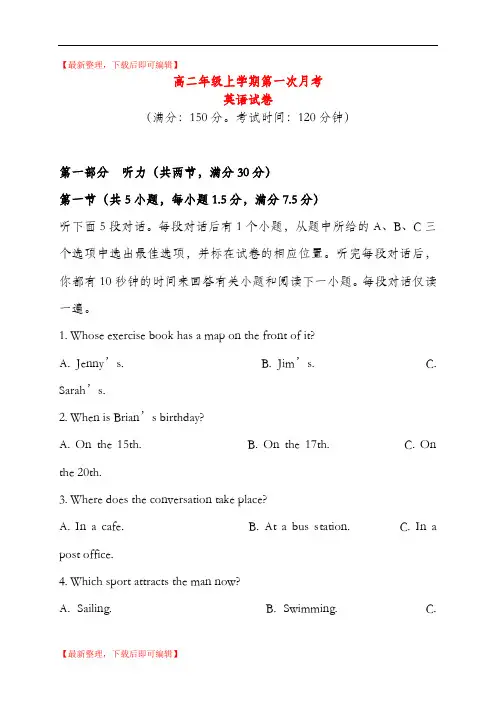
【最新整理,下载后即可编辑】高二年级上学期第一次月考英语试卷(满分:150分。
考试时间:120分钟)第一部分听力(共两节,满分30分)第一节(共5小题,每小题1.5分,满分7.5分)听下面5段对话。
每段对话后有1个小题,从题中所给的A、B、C三个选项中选出最佳选项,并标在试卷的相应位置。
听完每段对话后,你都有10秒钟的时间来回答有关小题和阅读下一小题。
每段对话仅读一遍。
1. Whose exercise book has a map on the front of it?A. Jenn y’s.B. Jim’s.C. Sarah’s.2. When is Brian’s birthday?A. On the 15th.B. On the 17th.C. On the 20th.3. Where does the conversation take place?A. In a cafe.B. At a bus station.C. In a post office.4. Which sport attracts the man now?A. Sailing.B. Swimming.C.Horse-riding.5. What are the speakers talking about?A. A dress.B. A party.C. The woman’s mother.第二节(共15小题,每小题1.5分,满分22.5分)听下面5段对话或独白。
每段对话或独白后有几个小题,从题中所给的A、B、C三个选项中选出最佳选项,并标在试卷的相应位置。
听每段对话或独白前,你将有时间阅读各个小题,每小题5秒钟。
听完后,各小题将给出5秒钟的作答时间。
每段对话或独白读两遍。
听第6段材料,回答第6至7题。
6. What are the speakers discussing?A. What to do tonight.B. Which film to watch.C. Where to have a meal.7. Why doesn’t the woman want to see a film at the cinema?A. She can’t afford the ticket.B. She has booked a table in a restaurant.C. She doesn’t like the films on show.听第7段材料,回答第8至9题。
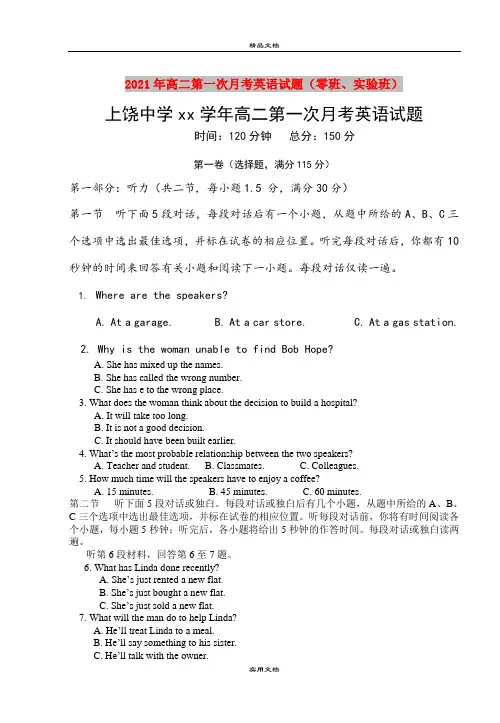
2021年高二第一次月考英语试题(零班、实验班)上饶中学xx学年高二第一次月考英语试题时间:120分钟总分:150分第一卷(选择题,满分115分)第一部分:听力(共二节, 每小题1.5 分,满分30分)第一节听下面5段对话,每段对话后有一个小题,从题中所给的A、B、C三个选项中选出最佳选项,并标在试卷的相应位置。
听完每段对话后,你都有10秒钟的时间来回答有关小题和阅读下一小题。
每段对话仅读一遍。
1.Where are the speakers?A. At a garage.B. At a car store.C. At a gas station.2. Why is the woman unable to find Bob Hope?A. She has mixed up the names.B. She has called the wrong number.C. She has e to the wrong place.3. What does the woman think about the decision to build a hospital?A. It will take too long.B. It is not a good decision.C. It should have been built earlier.4. What’s the most probable relationship between the two speakers?A. Teacher and student.B. Classmates.C. Colleagues.5. How much time will the speakers have to enjoy a coffee?A. 15 minutes.B. 45 minutes.C. 60 minutes.第二节听下面5段对话或独白。
每段对话或独白后有几个小题,从题中所给的A、B、C三个选项中选出最佳选项,并标在试卷的相应位置。
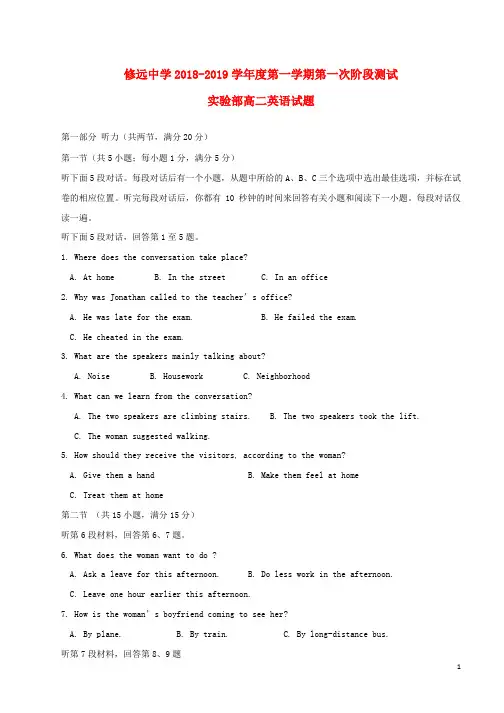
修远中学2018-2019学年度第一学期第一次阶段测试实验部高二英语试题第一部分听力(共两节,满分20分)第一节(共5小题;每小题1分,满分5分)听下面5段对话。
每段对话后有一个小题,从题中所给的A、B、C三个选项中选出最佳选项,并标在试卷的相应位置。
听完每段对话后,你都有10秒钟的时间来回答有关小题和阅读下一小题。
每段对话仅读一遍。
听下面5段对话,回答第1至5题。
1. Where does the conversation take place?A. At homeB. In the streetC. In an office2. Why was Jonathan called to the teacher’s office?A. He was late for the exam.B. He failed the exam.C. He cheated in the exam.3. What are the speakers mainly talking about?A. NoiseB. HouseworkC. Neighborhood4. What can we learn from the conversation?A. The two speakers are climbing stairs.B. The two speakers took the lift.C. The woman suggested walking.5. How should they receive the visitors, according to the woman?A. Give them a handB. Make them feel at homeC. Treat them at home第二节(共15小题,满分15分)听第6段材料,回答第6、7题。
6. What does the woman want to do ?A. Ask a leave for this afternoon.B. Do less work in the afternoon.C. Leave one hour earlier this afternoon.7. How is the woman’s boyfriend coming to see her?A. By plane.B. By train.C. By long-distance bus.听第7段材料,回答第8、9题8. What does the man’s wife want a television for?A. Watching news.B. Listening to music.C. Enjoying movies.9. How much is the bigger television this Friday?A. $ 256B. $368C. $416听第8段材料,回答第10至12题10. What is wrong with Kathy?A. She has burnt herself.B. She has had a heart attack.C. She has fainted11. Where does the man call from?A. Kathy’s homeB. A movie theatreC. A school building12. What does the woman ask the man to do?A. Ask others for helpB. Stay there with Kathy.C. Send Kathy to the hospital听第9段材料,回答第13至16题。
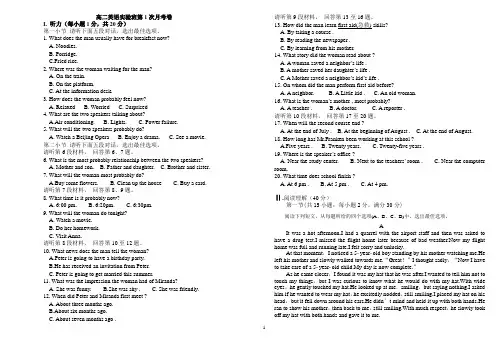
高二英语实验班第1次月考卷I.听力(每小题1分,共20分)第一小节请听下面五段对话,选出最佳选项。
1. What does the man usually have for breakfast now?A. Noodles.B. Porridge.C.Fried rice.2. Where was the woman waiting for the man?A. On the train.B. On the platform.C. At the information desk.3. How does the woman probably feel now?A. RelaxedB. WorriedC. Surprised4. What are the two speakers talking about?A.Air conditioning.B. Lights.C. Power failure.5. What will the two speakers probably do?A. Watch a Beijing OperaB. Enjoy a drama.C. See a movie. 第二小节请听下面五段对话,选出最佳选项。
请听第6段材料,回答第6、7题。
6. What is the most probably relationship between the two speakers?A. Mother and son.B. Father and daughter.C. Brother and sister.7. What will the woman most probably do?A.Buy some flowers.B. Clean up the houseC. Buy a card. 请听第7段材料,回答第8、9题。
8. What time is it probably now?A. 6:00 pm.B. 6:20pm.C. 6:30pm.9. What will the woman do tonight?A. Watch a movie.B. Do her homework.C. Visit Anna.请听第8段材料,回答第10至12题。
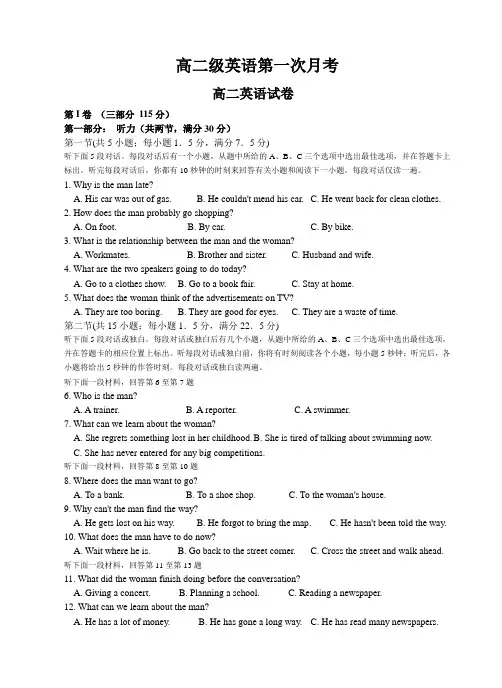
高二级英语第一次月考高二英语试卷第I卷(三部分115分)第一部分:听力(共两节,满分30分)第一节(共5小题;每小题1.5分,满分7.5分)听下面5段对话。
每段对话后有一个小题,从题中所给的A、B、C三个选项中选出最佳选项,并在答题卡上标出。
听完每段对话后,你都有10秒钟的时刻来回答有关小题和阅读下一小题。
每段对话仅读一遍。
1. Why is the man late?A. His car was out of gas.B. He couldn't mend his car.C. He went back for clean clothes.2. How does the man probably go shopping?A. On foot.B. By car.C. By bike.3. What is the relationship between the man and the woman?A. Workmates.B. Brother and sister.C. Husband and wife.4. What are the two speakers going to do today?A. Go to a clothes show.B. Go to a book fair.C. Stay at home.5. What does the woman think of the advertisements on TV?A. They are too boring.B. They are good for eyes.C. They are a waste of time.第二节(共15小题;每小题1.5分,满分22.5分)听下面5段对话或独白。
每段对话或独白后有几个小题,从题中所给的A、B、C三个选项中选出最佳选项,并在答题卡的相应位置上标出。
听每段对话或独白前,你将有时刻阅读各个小题,每小题5秒钟;听完后,各小题将给出5秒钟的作答时刻。
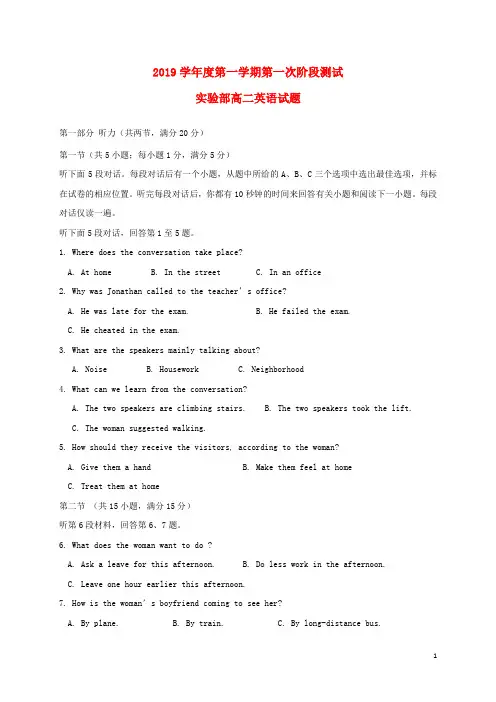
2019学年度第一学期第一次阶段测试实验部高二英语试题第一部分听力(共两节,满分20分)第一节(共5小题;每小题1分,满分5分)听下面5段对话。
每段对话后有一个小题,从题中所给的A、B、C三个选项中选出最佳选项,并标在试卷的相应位置。
听完每段对话后,你都有10秒钟的时间来回答有关小题和阅读下一小题。
每段对话仅读一遍。
听下面5段对话,回答第1至5题。
1. Where does the conversation take place?A. At homeB. In the streetC. In an office2. Why was Jonathan called to the teacher’s office?A. He was late for the exam.B. He failed the exam.C. He cheated in the exam.3. What are the speakers mainly talking about?A. NoiseB. HouseworkC. Neighborhood4. What can we learn from the conversation?A. The two speakers are climbing stairs.B. The two speakers took the lift.C. The woman suggested walking.5. How should they receive the visitors, according to the woman?A. Give them a handB. Make them feel at homeC. Treat them at home第二节(共15小题,满分15分)听第6段材料,回答第6、7题。
6. What does the woman want to do ?A. Ask a leave for this afternoon.B. Do less work in the afternoon.C. Leave one hour earlier this afternoon.7. How is the woman’s boyfriend coming to see her?A. By plane.B. By train.C. By long-distance bus.听第7段材料,回答第8、9题8. What does the man’s wife want a television for?A. Watching news.B. Listening to music.C. Enjoying movies.9. How much is the bigger television this Friday?A. $ 256B. $368C. $416听第8段材料,回答第10至12题10. What is wrong with Kathy?A. She has burnt herself.B. She has had a heart attack.C. She has fainted11. Where does the man call from?A. Kathy’s homeB. A movie theatreC. A school building12. What does the woman ask the man to do?A. Ask others for helpB. Stay there with Kathy.C. Send Kathy to the hospital听第9段材料,回答第13至16题。
2021年高二英语第一次月考试题实验班温馨提示:本试卷分试题和答题纸两部分,考试结束后,只交答题纸,试题自己保留。
满分150分,时间120分钟。
第一部分听力(共两节,满分30分)第一节(共5小题;每小题15分,满分7. 5分)听下面5段对话。
每段对话后有一个小题,从题中所给的A、B、C三个选项中选出最佳选项,并标在试卷的相应位置。
听完每段对话后,你都有10秒钟的时间来回答有关小题和阅读下一小题。
每段对话仅读一遍。
1.What’s John’s address?A.1343 King Street.B. 1344 Queen Street.C. 1434 King Street.2.How much should the skirt have cost?A . $6. B. $ 12. C. $ 24.3.What can we learn about the man?A .He might lie very often.B. His grandmother died just now.C. His grandfather gets ill quite often .4.Wh en is the man’s birthday?A .March 31st . B. April 1st . C. April 2nd.5.How will the woman get to New York?A By carB By trainC By airplane第二节(共15小题;每小题1. 5分,满分22. 5分)听下面5段对话或独白。
每段对话或独白后有几个小题,从题中所给的A、B、C三个选项中选出最佳选项,并标在试卷的相应位置。
听每段对话或独白前,你将有时间阅读各个小题,每小题5秒钟;听完后,各小题将给出5秒钟的作答时间。
每段对话或独白读两遍。
听第6段材料,回答第6、7题。
6.What will the woman do on Friday night?A. Visit a friend.B. Work overtimeC. Have dinner with Tim.7.What is the woman’s phone number?A.917-8427.B. 917-8426.C. 916-8426.听第7段材料,回答第8至10题。
高二英语上学期第一次月考试题(实验班)英语试题(实验班)(说明: 本试卷分第一卷(选择题95分) 和第二卷(非选择题25分) 两部分. 满分120 分, 考试时间90分钟.)第一卷( 选择题共两部分,计85分)第一部分:听力(共20题,满分20分)第二节:语法和词汇知识(共15小题;每小题1分,满分15分)21. I recognized him ______ I saw him in the picture,who invented_________telephone.A. for the moment /theB. the moment /theC. the minute/aD. immediately/a22. _____ in the mountains for a week, the two students were finally saved by the local police.A. Having lostB. LostC. Being lostD. Losing23. There is no ___________ in trying to talk him into joining us. He enjoys being alone.A. doubtB. wonderC. hopeD. point24. —Why did you come late this morning?—We were for an hour in the traffic jam.A.taken up B.given up C.held up D.put up25. A heavy snow____ a harvest year.A. expects B .wishes C. hopes D. promises26. _____ 20 girls Class 10 ______ another 30 boys.A. In addition to; haveB. Except for; haveC. Apart from; hasD. Except ; has27. Every time ______ I go to school, I am usually riding my bike, _____ I take a bus.A. when; besidesB. /; except whenC. when; except forD. /; except that28. It had never come to my mind that this should have happened to me!A.wouldB. mightC. shouldD.could29. He used to be a popular singer, but drug ____ his ruin.A. resulted fromB. contributed toC. attended toD. devoted to30. When I handed the report to John,he said that George was the person______.A.to send B.for sending C.to send it to D.for sending it to 31. ____ Jill was worried seemed obvious to everyone present at the meeting.A. WhatB. ThatC. WhetherD. /32. This is an illness that may result in total blindness if _________.A. being left untreatedB. left untreatedC. to be left to be untreatedD. left being untreated.33. _______, crying.A. Came in Jack’s wifeB. In came Jack’s wifeC. Came in sheD. In came she34. The Group of Eight (G8) ______ the eight richest countries in the world.A. made up ofB. consists ofC. is consisted ofD. forms of35. It is reported that a province has ______ to form a new state.A. broken downB. broken upC. broken awayD. broken out第三节:完形填空.(共20题;每小题1分,满分20分)Britain and IrelandThe British Isles is made up of two large islands: One is called Ireland and the other __36 . Britain, or Great Britain, is the larger of these two islands, and it is 37 into three parts: Scotland, Wales and England.The United Kingdom is that 38 of the British Isles ruled over by the Queen. It is made up of Scotland, Wales and England, that is, the 39 of Britain, and also about one sixth of Ireland, the Northern part. The 40 of Ireland is self-governing. The 41 name of the United Kingdom is 42 “The United Kingdom of Great Britain and Northern Ireland”.43 is larger and richer than Scotland, Wales and Northern Ireland, and has the largest 44 of the United Kingdom, so people often use the 45 “England” and “English” when they46 “Britain” and “British”. This sometimes makes the Scots and the Wels h a little 47 . The Scots in particular are very 48 of their separate nationality. The Welsh too do not regard 49 as English, and have a culture and even a 50 of their own.Ireland became part of the United Kingdom in 1801, but for forty years the “Irish 51 ” was the greatest headache of the United Kingdom. 52 , Ireland is divided into two: Northern Ireland still 53 to the United Kingdom, and in 1922 the rest of Ireland 54 to found an Irish Free State, later called Eire and now the Republic of Ireland.The Republic of Ireland does not regard itself as part of Britain, and is not now even a supporter of the Commonwealth of Nations (英联邦). Unlike the major Commonwealth countries it did not lift a finger to 55 British in the Second World War and now wants the whole of Ireland to be a republic.36. A. Wales B. Britain C. England D. Scotland37. A. divided B. cut C. broken D. separated38. A. piece B. island C. country D. part39. A. south B. north C. part D. whole40. A. smaller B. larger C. rest D. island41. A. correct B. true C. full D. complete42. A. also B. therefore C. likely D. perhaps43. A. The UK B. The British isles C. Great Britain D. England44. A. colleges B. officials C. cities D. population45. A. words B. names C. spellings D. pronunciations46. A. call B. forget C. speak D. write47. A. angry B. difficult C. tired D. lonely48. A. proud B. fond C. full D. kind49. A. it B. Wales C. them D. themselves50. A. capital B. language C. history D. programs51. A. Country B. Question C. Disease D. Republic52. A. At last B. So C. Meanwhile D. Also53. A. returns B. belongs C. gets D. speaks54. A. hoped B. refused C. broke away D. used55. A. feel B. touch C. fight D. help第二部分:阅读理解(共15 小题,每小题2分,满分30分)AA good teacher is many things to many people. In my own experience, the people I respect the most and think about the most are the teachers who demanded the most discipline (纪律) from their students.I miss one teacher in particular that I had in high school. I think she was a good teacher because she was a very strict person. I remember very clearly a sign on her classroom door. It was a simple sign that said, “Laboratory : in this room the first five letters of the word was stressed not the last seven.” In other words, labor for her was more important than oratory, which means making speeches.She prepared her work very carefully and told us to do the same. We got lots of homework from her. Once she had broken her arm, and everybody in the class thought that maybe the homework load would be reduced, but it continued just the same. She checked our work by stamping her name at the bottom of the papers to show that she had read them.I think sometimes teachers who demand the most are liked the least. But as time goes by, this discipline really seems to benefit the students.56. Which of the following is considered a good teacher by the writer?A. A patient teacher.B. An honest teacher.C. A strict teacher.D. An easy – going teacher.57. The teacher put up the sign on her classroom door .A. to remind the students that this room was a laboratoryB. to advise the students to follow the disciplinesC. to warn the students not to be carelessD. to tell the students to work hard in the classroom58. What’s the writer’s opinion of discipline?A. It makes the students dislike their teachers.B. It does good to the students in the long run.C. It’s too much for young children.D. It does more harm than good to the students.59. What’s the Chinese for the underlined word “oratory”?A. 演讲B. 讲稿C. 访谈D. 采访BIn the traditional marriage, the man worked at a job to earn money for the family. Most men worked in an office, a factory, or some other place away from the home. Since the man earned the money, they paid the bills. The money was used for food, -clothes, the house, and other family needs, the man made most of the decisions. He was the boss.In the traditional marriage, the woman seldom worked away from the house. She stayed at home to care for the children and her husband. She cooked meals, cleaned the house, washed the clothes, and did other housework. Her job at home was very important.In recent years, many couples continues to have a traditional relationship of the kind. The man has a job and earns the money for the family. The woman stays at home and cared for the children and the house. Many Americans are happy with the kind of marriage. But some other Americans have a different impression of marriage and family responsibilities.There are two important differences in male and female roles now. One is that both men and women have many more choices. They may choose to marry or to stay single. They may choose to work or stay at home. Both men and women may choose roles that are comfortable for them.A second difference in male and female roles is that within marriage many decisions and responsibilities are shared. The husband and wife may choose to have children, or they may not. If they have children, the man takes care of them some of the time, all of the time or not at all. The woman may want to stay at home and take care of the children, or she may vant to go to work. Men and women now decide these things together in a marriage. Many married people now share these decisions and responsibilities of their families.60. Which of the following is NOT true in the traditional marriage ?A. Men worked at a job to earn money for the family.B. The woman made most of decisions.C. The woman stayed at home to care the children.D. The man paid the bills.61. In recent years____________.A. young couples refuse the traditional relationshipB. the woman has a job and earns the money for the familyC. the woman doesn' t stay at home and care for the children and the houseD. the role of men and women has begun to change62. Men and women may now choose all the following EXCEPT to________.A.have their roles that are comfortable for themB. work or stay at homeC. leave their jobs just because they have childrenD. marry or to stay single63. The following are all now true EXCEPT__________.A. they may choose to have children or notB. the man may take care of the children some of the timeC. the woman may want to go to workD. the woman is the most important person in the houseCRecently I overheard a father and daughter in their last moments together at the airport. The airline had announced her departure and standing near the security gate, they hugged and he said, “I love you. I wish you enough.”She in turn said, “Dad, our life together has been more than enough. Y our love is all I ever needed. I wish you enough, too, Dad.” They kissed and she left.He walked over toward the window where I was seated. Standing there I could see he wanted and needed to cry. I tried not to intrude ( 打扰) on his privacy, but he welcomed me in by asking, “Did you ever say good-bye to someone knowing it would be forever?”“Yes, I have,” I replied. “Forgive me for asking, but why is th is a forever good-bye?” “I am old and she lives much too far away. I have challenges ahead, and the reality is, the next trip back will be for my funeral(葬礼),” he said.“When you were saying good-bye I heard you say, ‘I wish you enough’. May I ask what tha t means?”He began to smile. “That’s a wish that has been handed down for many generations within my family. My parents used to say it to everyone.”He paused for a moment, looking up as if trying to remember it in detail, and then he smiled even more. “When we said ‘I wish you enough’, we were wanting the other person to have a life filled with just enough good things to sustain(使……持续)them,” he continued and then turning toward me he shared the following:“I wish you enough sun to keep your attitude bright.I wish you enough rain to appreciate the sun more.I wish you enough happiness to keep your spirit alive.I wish you enough pain so that the smallest joys in life appear much bigger.I wish you enough gain to satisfy your wanting.I wish you enough loss to appreciate all that you possess.I wish you enough ‘Hellos’ to get you enough the final ‘Good-byes’.”Then he walked away.I WISH YOU ENOUGH!64.The father was at the airport to ________.A.welcome his daughter home. B.see his daughter offC.meet his daughter and the author D.share the touching poem with the author 65.It can be inferred that ________.A.the daughter was eager to leave her father.B.It was not convenient for the father and daughter to see each other face to face.C.The daughter is looking forward to her father’s funeral.D.The daughter did not want her father to live together with her.66.What is probably the aut hor’s feeling after hearing the father’s words explaining the meaning“I wish you enough”?A.moved B.satisfied C.interested D.sorrowful67.Which is probably the best title of this story?A.Enough is Enough B.You Can Never be Happy EnoughC.Father and Daughter D.I Wish You EnoughDLifeguard, sportscaster, movie star, governor, president —there wasn’t much Ronald Reagan didn’t do in life."The world was a vast opportunity for him," Lou Cannon wrote in his biography (传记) of the former US president, who died on June 5, aged 93.Reagan’s final years saw him fight a losing battle against Alzheimer’s disease (老年痴呆症). But his positive (积极的) attitude toward life has given hope to many people.Born in 1911 to a poor family in a small town in Illinois, his father was a failed salesman who drank too much. It was in these difficult times, though, that Reagan developed the powerful optimism (乐观) that would serve him so well. He always believed better times laying ahead, and this was reflected in his high school yearbook entry. "Life is one grand, sweet song, so start the music," he wrote.As a teenager, Reagan spent summers working as a lifeguard at a local beach, saving 77 lives in seven years. He graduated from college in 1932 with a degree in economics and sociology. But America was still in the middle of the Great Depression (经济大萧条), and jobs were hard to find. Reagan finally found work as a radio sports announcer and this road led him to Hollywood in 1937. During the 20 year film career, he never became a leading star. As in his lifeguard days, Reagan loved to play the hero and only took the role of a bad guy once in more than 50 films.A talented speaker who was always able to connect with his audience, Reagan became involved in (参与) politics in the 1950s. This popular touch led to him being elected the governor of California in 1967.All the while Reagan was in California, he had his eye on the White House. In 1980, aged 69, he became the oldest man ever elected president.He held office from 1981 to 1989, the first president to serve two complete terms after World War Ⅱ. When he left, aged 77, he held the highest popularity rate of any retiring (离职的) president in US history.He remained positive even when he discovered he had an illness that would destroy him. "I will leave with the greatest love for this country of ours and eternal (永恒的) optimism for its future," he wrote.68. Reagan can be best described as a man with______.A. firmnessB. humourC. optimismD. talent69. Which is the correct order of events described in the passage?a. Reagan fought a losing battle against Alzheimer’s disease.b. Reagan became an actor.c. Reagan worked as a lifeguard.d. Reagan graduated from college.e. Reagan was elected the governor of California.A. a,c,d,e,bB. e,c,d,b,aC. b,a,c,d,eD. c,d,b,e,a70. When the author of Reagan’s biography says "The world was a vast opportunity for him," hereally means that _______.A. Reagan achieved much in his whole lifeB. Reagan could have done much betterC. Reagan did much for America and the worldD. Reagan was a very lucky man第二卷非选择题(共三节满分35 分)第一节:单词拼写(共10 小题,每小题1分,满分10分)根据下列句子所给首字母在横线上写出空缺处各单词的正确形式。
2019-2020年高二英语上学期第一次月考试题实验班第一部分听力(共两节,满分30分)第一节(共5小题;每小题1.5分,满分7.5分)听下面5段对话,每段对话后有一个小题,从题中所给的A、B、C三个选项中选出最佳选项,并标在试卷的相应位置。
听完每段对话后,你都有10秒钟的时间来回答有关小题和阅读下一小题。
每段对话仅读一遍。
1.How much will the man pay if he wants two shirts?A.35 dollars.B.60 dollars.C.70 dollars.2.Where are the speakers?A.In a restaurant.B.At a bus-stop.C.In a library.3.What does the man wish to do?A.Avoid the rush hour.B.Go to a park.C.Park his car.4.When does the second bus leave on Saturdays?A.At 7:30.B.At 8:30.C.At 9:30.5.What is the man’s present job?A.A driver.B.A waiter.C.A businessman.第二节(共15小题;每小题1.5分,满分22.5分)听下面5段对话或独白。
每段对话或独白后有几个小题,从题中所给的A、B、C三个选项中选出最佳选项,并标在试卷的相应位置。
听每段对话或独白前,你将有时间阅读各个小题,每小题5秒钟;听完后,各小题将给出5秒钟的作答时间。
每段对话或独白读两遍。
听第6段材料,回答第6、7题。
6.When will they play tennis?A.Tomorrow morning.B.Tomorrow evening.C.The day after tomorrow.7.What should the woman remember to bring?A.Some food.B.Some water.C.Extra tennis ball.听第7段材料,回答第8、9题。
——————————教育资源共享步入知识海洋————————2019学年度第一学期第一次阶段测试实验部高二英语试题第一部分听力(共两节,满分20分)第一节(共5小题;每小题1分,满分5分)听下面5段对话。
每段对话后有一个小题,从题中所给的A、B、C三个选项中选出最佳选项,并标在试卷的相应位置。
听完每段对话后,你都有10秒钟的时间来回答有关小题和阅读下一小题。
每段对话仅读一遍。
听下面5段对话,回答第1至5题。
1. Where does the conversation take place?A. At homeB. In the streetC. In an office2. Why was Jonathan called to the teacher’s office?A. He was late for the exam.B. He failed the exam.C. He cheated in the exam.3. What are the speakers mainly talking about?A. NoiseB. HouseworkC. Neighborhood4. What can we learn from the conversation?A. The two speakers are climbing stairs.B. The two speakers took the lift.C. The woman suggested walking.5. How should they receive the visitors, according to the woman?A. Give them a handB. Make them feel at homeC. Treat them at home第二节(共15小题,满分15分)听第6段材料,回答第6、7题。
6. What does the woman want to do ?A. Ask a leave for this afternoon.B. Do less work in the afternoon.C. Leave one hour earlier this afternoon.7. How is the woman’s boyfriend coming to see her?A. By plane.B. By train.C. By long-distance bus.听第7段材料,回答第8、9题8. What does the man’s wife want a television for?A. Watching news.B. Listening to music.C. Enjoying movies.9. How much is the bigger television this Friday?A. $ 256B. $368C. $416听第8段材料,回答第10至12题10. What is wrong with Kathy?A. She has burnt herself.B. She has had a heart attack.C. She has fainted11. Where does the man call from?A. Kathy’s homeB. A movie theatreC. A school building12. What does the woman ask the man to do?A. Ask others for helpB. Stay there with Kathy.C. Send Kathy to the hospital听第9段材料,回答第13至16题。
2021年高二上学期第一次月考英语试题(实验班)含答案第一部分:听力(共两节,满分20分)第一节(共5小题;每小题1分,满分5分)听下面5段对话。
每段对话后有一个小题,从题中所给的A、B、C三个选项中选出最佳选项,并标在试卷的相应位置。
听完每段对话后,你都有10秒钟的时间来回答有关小题和阅读下一小题。
每段对话仅读一遍。
1. Who is answering the phone?A. Elaine.B. Allan MacFarlane.C. Bob Harris.2. What happened to the driver?A. He ran into a bicycle.B. He drove too slowly.C. He ran into a tree.3. What can we learn from the dialogue?A. They like summer.B. They don't like summer.C. They think hot weather is nicer.4. When should Susan go to meet Professor Brown?A. At 9:30.B. At 10:00.C. At 10:30.5. What does the woman plan to do this afternoon?A. Buy a new pair of glasses.B. Shop for some clothes.C. Go to her classes.第二节(共15小题;每小题1分,满分15分)听下面5段对话或独白。
每段对话或独白后有几个小题,从题中所给的A、B、C三个选项中选出最佳选项,并标在试卷的相应位置。
听每段对话或独白前,你将有时间阅读各个小题,每小题5秒钟;听完后,各小题将给出5秒钟的作答时间。
每段对话或独白读两遍。
听第6段材料,回答第6至8题。
宿迁市学年度第一学期第一次月考试题
高二年级英语(实验班)
(满分分,考试时间分钟)
第一部分:听力(共两节,满分分)
第一节(共小题;每小题分,满分分)
听下面段对话。
每段对话后有一个小题,从题中所给的、、三个选项中选出最佳选项,并标在试卷的相应位置。
听完每段对话后,你都有秒钟的时间来回答有关小题和阅读下一小题。
每段对话仅读一遍。
. ?
. . . . . .
. ?
. . . . . .
. ?
. . . ' . . .
. ?
. . . . . .
. ?
. . . . . .
第二节(共小题;每小题分,满分分)
听下面段对话或独白。
每段对话或独白后有几个小题,从题中所给的、、三个选项中选出最佳选项,并标在试卷的相应位置。
听每段对话或独白前,你将有时间阅读各个小题,每小题秒钟;听完后,各小题将给出秒钟的作答时间。
每段对话或独白读两遍。
听第段材料,回答第至题。
. ?
. . . . . .
. ?
. . . . . . . . .
. ?
. . . . . .
听第段材料,回答第至题。
. ?
. . . . . .
. ' ?
. . . . . .
. ?
. . . .
. .
听第段材料,回答第至题。
. ' ?
. . . . . .
. ' ?
. . . .
. .
. ?
. .
. . . .
听第段材料,回答第至题。
. ?
. . . . . .
. ?
. . . .
. ' .
. ?
. ' . . . . .
听第段材料,回答第至题。
. ?
. China. . US .
. .
. China ?
. . . . . .
. ?
. China .
. .
. .
第二部分:英语知识运用(共两节,满分分)
第一节:单项填空(共小题;每小题分,满分分)。
,,.
.;.;不填.不填;.不填;不填() —.
. . . .
. .
. ; ; . ; ; . ; ; . ; ;
. , .
. . . .
, .
. . . .
.
. . . .
Paris .
. . . .
China’Suzhou, .
. . . .
' .
.
. ; . ; . ; . ;
' .
. . . .
. ?
—, .
. . . .
. , .
. . . .
.—Mount Tai?
—.
..
..
. é, , , .
. . . .
,?.
!' .
..' ..'
第二节完形填空(共小题;每小题分,满分分)
阅读下面短文,掌握其大意,然后从各题所给的四个选项(、、和)中,选出最佳选项。
, . , , , () .
in . , “” . . in ’ (冷落) . . , , ! .
. ’ .
() . . , . , .
, .
. ’. , .
’ ? .
. . . . .
. . . . .
. . . . .
. . . . .
. . . . .
. . . . .
. . . . .
. . . . .
. . . . .
. . . . .
. . . . .
. . . . .
. . . . .
. . . . .
. . . . .
. . . . .
. . . . .
. . . . .
. . . . .
. . . . .
第三部分:阅读理解(共小题;每小题分,满分分)
阅读下列短文,从每题所给的、、、四个选项中,选出最佳选项。
? , ' . , ' . . ;
) ?
(使孤立). . , .
) ?
, . , ' . .
) ?
. , . , ' .
) ?
' ' .
) ?
, . .
, . ' . , .
. ?
. .
. .
. .
. .
. ?
. ,
. .
. .
. .
. ?
. . . . . . . .
' . , , , , , ' . . , , , , , . . “ , ?" . " ?" . " . : ." " ," . "?"" , .".
, . , . . "' , " . : , , , , . , ' . . ,. , .
. , ’ ’ . , , ?
' . . . . ", , , ." . " . . . , , . , ' . , ' ' . . ' , . . . , ' . . " , Nan, "' , ' ?" .
' , , ' , . Shannon , , . ' ; . , , ,.
. .
. .
. .
. .
. Nan .
. Nan’ ?
. .
. , .
. .
. , .
. ?
.
.
.
. .
. ’ . .
. .
. .
. .
. ’ .
island . ’.
. “, ,”, University Dundee .
S . , , , , , .
’ Campbell Island, . Campbell Island .
“’.”. “, , , Campbell Island Rat Island, .”
. , . “’,”.
. , “, .”
. , island ?
. .
. Campbell Island.
. .
. .
. ?
. .
. .
. .
. Campbell Island Rat Island.
. .
. Campbell Island .
. .
. .
. .
. ?.
. .
. ’.
. ’.
. Campbell Island.
, , , $, .
, . , $.
, . , , , , . . (借记卡), $(欺诈的) . , $.
, . ’ .
, . , , .
, . , . , .
. ?
. .
. .
. ’ .
. .
. “ ” “”.
. . . .
. , ?
. ’ .
. .
. ’ .
. .
. ?
. .
. .
. .
. .
第Ⅱ卷(共两节,共分)第四部分任务型阅读(共小题;每小题分,满分分)
注意:每空限填个单词。
(勇敢的) . ? ’ , .
, ’ (公然的) , , . , , ’ .
’ , ’ , ?
’ , . , .
, . (足智多谋) , .
, , . , .
, , , .
(灌输) , ’ , .
’ , .
第五部分:书面表达(满分分)
“实行低碳经济”,“过低碳生活”,现在已经成为了人们关注的热门话题。
最近,你们班的同学就这个话题展开了热烈的讨论。
请你根据下表提供的信息,给写篇文章,报道你们班级的讨论情
注意:
对所给要点,逐一陈述,适当发挥,不要简单翻译。
字数左右。
开头已经写好,不计入总字数。
, . .
命题教师:宿迁青华中学于艳丽
审稿教师:宿迁青华中学王永柱
宿迁市学年度第一学期第一次月考试题
高二年级英语试题
答题纸
任务型阅读
书面表达。